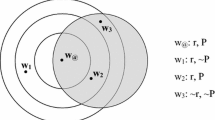Abstract
Dretske proposes a theory of knowledge in terms of a theory of information, but wishes to deny that empirical knowledge settles the large question of scepticism. This leads him to deny the closure of knowledge under known entailment. In a recent paper Jäger argues that Dretske’s theory of information entails closure for knowledge, ‘at least for the kind of propositions here at issue’ (Jäger 2004:194). If Jäger is right, Dretske is seriously embarrassed and must give something up. In this paper I show that there are two flaws in Jäger’s argument. The principle of informational closure considered by Jäger is incompatible with Dretske’s theory of information, and Jäger’s argument that Dretske is committed to a certain kind of substitution instance of that principle of informational closure is invalid. I propose adequacy conditions on signalled information and use them to motivate a formulation of a general closure principle for signalled information. I show that Dretske’s account of information satisfies the adequacy conditions, but in a way which commits him to an instance of the general closure principle. I argue that Dretske is consequently committed to closure for some cases of knowledge for which he wishes to deny closure. Finally, I sketch how, on the basis of the closure principle to which Dretske is committed, Jäger’s broader argument may yet go through.
Similar content being viewed by others
References
Dretske F. I. (1970). Epistemic Operators. Journal of Philosophy 67:1007–1023
Dretske F. I. (1981). Knowledge and the Flow of Information. Oxford, Blackwell
Dretske, F. I.: 1983, ‘Precis of Knowledge and the Flow of Information’, Behavioural Brain Sciences, 6 pp. 55–63. Reprinted in S. Bernecker and F.I. Dretske (eds) 2000. Knowledge: Readings in Contemporary Epistemology. Oxford University Press.—to which page references refer
Dretske F. I. (2004). Externalism and Modest Contextualism. Erkenntnis 61:173–186
Dretske F. I. (2005). Is Knowledge Closed under Known Entailment?. In: Sosa E. (eds), Contemporary Debates in Epistemology. Oxford, Blackwell
Jäger C. (2004). Skepticism, Information, and Closure: Dretske’s Theory of Knowledge. Erkenntnis 61:187–201
Acknowledgements
I am grateful to Peter Baumann, Fred Dretske and Christoph Jäger for their helpful discussions and comments. Work on this paper was supported by the John Templeton Foundation.
Author information
Authors and Affiliations
Corresponding author
Rights and permissions
About this article
Cite this article
Shackel, N. SHUTTING DRETSKE’S DOOR. Erkenntnis 64, 393–401 (2006). https://doi.org/10.1007/s10670-006-9002-5
Received:
Accepted:
Published:
Issue Date:
DOI: https://doi.org/10.1007/s10670-006-9002-5




